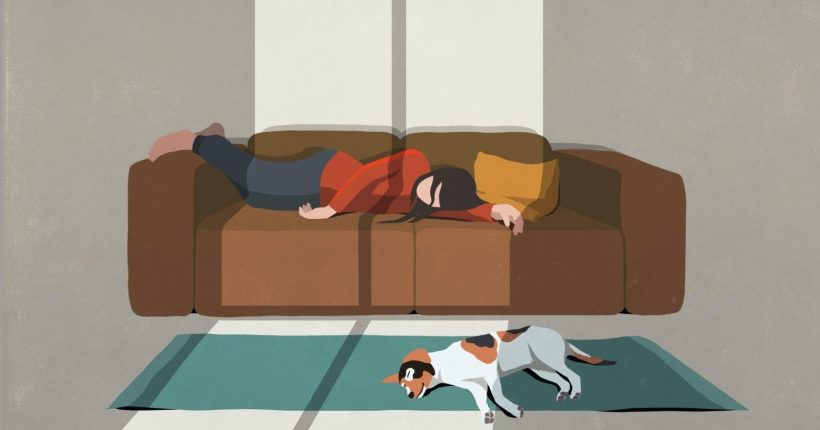If you’ve been dealing with symptoms including fatigue, irritability and difficulty concentrating after the Christmas break, you may be suffering from ‘social jetlag’. Here’s how to overcome this common issue.
Despite the expectation that January should be a time for making fresh starts and forging new habits, getting into the swing of things isn’t always as easy as it’s made out to be.
In fact, for many people, this time of year is one dominated by feelings of fatigue and general ‘bleh’-ness – thanks in no small part to a phenomenon called ‘social jetlag’.
While social jetlag is a term often used to describe the feelings of confusion and tiredness associated with the clocks going back or jumping forward, it can also describe the symptoms that many people experience after the Christmas break, when our eating, drinking and sleeping habits have been disrupted for a week or longer.
“Sleeping in more than usual and heading to bed later than our normal routine can cause a shift in our body’s natural cycle (circadian rhythm),” explains Fatmata Kamara, Bupa’s mental health advisor.
“Like jetlag when we travel, your body clock may be out-of-sync, which can leave your body feeling a bit muddled.”
While many people experience social jetlag after the Christmas break, when the festivities lead to many of us staying up later and sleeping in more than usual, the term – which was coined by the German scientist Professor Till Roennenberg in 2006 – can be used to describe any kind of discrepancy between someone’s circadian rhythm and the time they’re expected to wake up and fall asleep due to social constraints such as work.

Alongside the expected feelings of fatigue, other symptoms associated with social jetlag include increased irritability and difficulty concentrating – all of which can take their toll on your mental health if not addressed.
“Aside from feeling tired, social jetlag puts you at increased risk of certain mental health conditions, including anxiety, stress and depression,” Kamara highlights. “Some studies have also shown that social jetlag can lead to a greater consumption of alcohol and smoking, as well as putting you at risk of heart disease.”
While these long-term effects may sound scary, the good news is that social jetlag is reversible.
However, it’s not as simple as ‘catching up’ on sleep or going to bed early for a couple of nights – if your body has become programmed to fall asleep later and wake up later, your body’s internal rhythm (and therefore the chemicals which dictate whether you feel sleepy or awake) is still going to be different to the one you’re forcing it to follow.
In this way, the key to overcoming social jetlag is making a sustained effort to get your circadian rhythm back in line with your working routine. So, how can you go about doing that? Keep reading to check out Kamara’s top tips.
1. Listen to your body

If your body is crying out for rest, it’s important to try and give it what it needs.
“Being in tune to your mind and body will help you make better decisions and become more resilient because of it,” Kamara explains. “Take note of your mind and body’s needs. For example, if your body is telling you to rest, take it easy for a few days and see if you start feeling better.”
2. Avoid napping
While the idea of an afternoon nap may seem appealing when you’re feeling exhausted, doing so could actually impede your efforts to get your body’s rhythm back on track.
“If you’ve had a bad night’s sleep and you’re feeling tired, you may be tempted to take a nap during the day,” Kamara says. “However, while a short power nap in the early part of the afternoon can be helpful for some people, it’s best to avoid having a long nap, or napping later in the day, as this could affect your sleep at night.”
3. Switch off your digital devices
When you’re trying to restore your body’s natural rhythm, the last thing you want is an artificial light source messing things up even further. For this reason, you’ll want to avoid using digital devices before you go to bed.
“It’s important to reduce light before you sleep as artificial lighting can trick your body into thinking it’s daylight, disrupting your normal cycle,” Kamara says.
“Resting in a cool, dark room with no distractions can help you drift off quickly. Try to get as comfortable as possible and power down your phone, as the light on your screen can actually keep you awake.”
4. Maintain a routine

The key to getting your body back into its natural rhythm is to give it the routine it craves – even when you’re feeling tired and irritable.
“Don’t underestimate the importance of a healthy, regular routine,” Kamara says. “Taking steps to live in a healthier way can make a real difference to your mood.
“Our bodies love routine, so try going to bed and waking up at a similar time to what you would before the Christmas period. Making time to wind down before bed can help you get to sleep more easily: you can do this by either reading, practising mindfulness, or reducing screen time.”
5. Try and lead a healthy lifestyle
While it’s OK to enjoy yourself (especially over the Christmas break), leading a predominantly healthy lifestyle is key to keeping your body feeling happy and healthy.
“A sedentary lifestyle and too much alcohol can have a surprising effect on your body’s natural cycle,” Kamara explains. “Be mindful of your alcohol intake: when it comes to alcohol, consumption may make you feel sleepy and reduce the time it takes for your to fall asleep. However, once the alcohol wears off it is likely you will sleep lighter and have more disturbances during the night, leaving you feeling less refreshed in the morning.”
She continues: “Most people are aware of the physical health benefits from cutting down on alcohol, but it also has mental health benefits. For example, alcohol can make people feel more anxious – so cutting down can help manage anxiety.
“Drinking tea, coffee or energy drinks during the day can also impact your night’s sleep. While people process caffeine differently, it’s recommended that we stop drinking caffeine after 3pm – so consider switching to decaf or herbal teas after then.”
6. Seek support
If you’re struggling with your social jetlag, it’s important to reach out and get support from others.
“We fall asleep better when there’s nothing preoccupying our minds, so it’s important to speak to someone if you’re either struggling to sleep, or you’re experiencing a constant, low mood,” Kamara says.
“It’s important to remember that there is always support available, and it can feel a huge relief to open up about how you’re feeling. Speak to your doctor, loved one, or a healthcare professional if you’re worried.”
If you, or someone you know, is struggling with their mental health or emotional wellbeing, you can find support and resources on the mental health charity Mind’s website and NHS Every Mind Matters or access the NHS’ guide to local mental health helplines and organisations here.
If you are struggling, you can also ask your GP for a referral to NHS Talking Therapies, or you can self-refer.
You can also call the Samaritans in the UK on 116 123 or email [email protected] for confidential support. In a crisis, call 999.
Images: Getty
Source: Read Full Article






